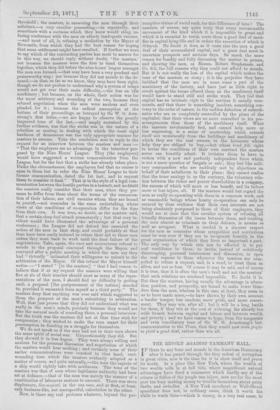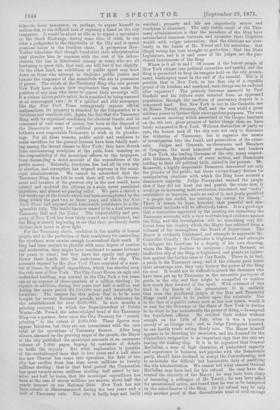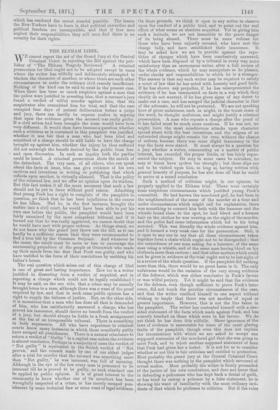THE REVOLT AGAINST TAMMANY HALL.
I17 there be any bone and muscle in the American Democracy 1 after it has passed through the fiery ordeal of corruption in great cities, now is the time for it to show itself and prove its worth. In a place like New York, where the wealth of two worlds rolls in at full tide, where magnificent natural advantages have fixed a commerce which hardly any of the crimes or follies of the people can injure, men are for the most part too busy making money to trouble themselves.about petty thefts and swindles. A New York merchant or Wall-Street speculator does not, in ordinary cases, think it worth his while to waste time—which is money, in a very real sense, to
him—to incur annoyance, or, perhaps, to expose himself to serious risk, in the difficult task of exposing a fraud on the city taxpayers. It would be about as idle as to expect a speculator on the Stock Exchange, during some time of crisis, to run after a pickpocket in the labyrinths of the City and to spend precious hours in the fruitless chase. A prosperous New- Yorker calculates that though fraudulent civic administration may plunder him in common with the rest of his fellow-
citizens, the loss is distributed among so many who are all
hastening to grow rich, that each one will feel it but slightly. On the other hand, an exhibition of public spirit may draw down on those who attempt to vindicate public justice and honour the vengeance of the scoundrels who are in possession of power. The chiefs of the Tammany Ring who now govern New York have shown how unpleasant they can make the position of any man who dares to oppose their sovereign will. If a citizen shows public spirit, he is punished by being assessed at an extravagant rate ; or if a spirited and able newspaper like the New York Times courageously exposes official malpractices, its property is attacked by the Corporation in a frivolous and vexatious suit. Again, the fact that the Tammany Ring, with its organized machinery for electoral frauds, and its command of vast sums of money, has been at the disposal of the Democratic party for political purposes, had induced hitherto even respectable Democrats to wink at its plunder- ings. For all these reasons, public spirit and readiness to make sacrifices for the general interest have been fatally want- ing among the decent classes in New York ; they have shrunk from encountering rowdyism at the polls, from insisting on the responsibility of the municipal officers to the taxpayers, from demanding a strict account of the expenditure of the public money. Naturally, rowdyism has had all its own way at election, and corruption has reigned supreme in the muni- cipal administration. We cannot be astonished that the Tammany Ring, thus left to work their will with the Govern- ment and taxation of the greatest city in the new world, have robbed and mulcted the citizens on a scale never paralleled anywhere, and almost surpassing belief. We gave a sketch a few weeks ago of the frauds which had been accomplished by the Ring within the past two or three years, and which the New York Times had exposed with honourable persistence in a dis- agreeable duty, The battle has now ceased to be a duel between Tammany Hall and the Times. The respectability and pro- perty of New York has been fairly roused and frightened, and the Ring is clearly beginning to see that their previously docile victims now mean to show fight.
For the Tammany chiefs, confident in the apathy of honest people, and in the perfection of their machinery for controlling the elections, were unwise enough to overshoot their mark, If they had been content to plunder with some degree of caution and moderation, they might have continued to amass fortunes for years to come ; but they have too openly and grossly thrust their hands into the cash-boxes of the city. The accounts exposed by the New York Times consisted of a num- ber of items, for alleged expenditure, which has startled even the rich men of New York. The City Court House, an ugly and unfinished building, was erected in the City Park a few years ago at an expense of three-quarters of a million sterling ; its repairs, in addition, during two years cost half a million, and during the same period £1,150,000 was paid nominally for furniture. The carpets for this palace that is to be were bought for seventy thousand pounds, and the stationery for the establishment for over £400,000. In nine months a printing company, in which the Superintendent of Public Works—Mr. Tweed, the acknowledged head of the Tammany Ring—is a partner, drew upon the City Treasury for county printing " to the extent of £300,000. These figures may appear fabulous, but they aro not inconsistent with the sum total of the operations of Tammany finance. After long silence, alarmed by the growing anger of the people, the Mayor of the city published the municipal accounts in an enormous volume of 7,000 pages, hoping by confusion of details to baffie the inquiry. But what explanation is possible of the unchallenged facts that in two years and a half since the new Charter has come into operation, the debt of the city has swollen from less than seven millions to twenty millions sterling ; that in that brief period the Corporation has spent twenty-seven millions sterling, half raised by tax- ation and half by loans, that the municipal expenditure has been at the rate of eleven millions per annum, about half the yearly interest on our National Debt. New York has not been rebuilt or Haussmannized during the two years and a half of Tammany rule. The city is badly kept and badly watched ; property and life are imperfectly secure and rowdyism is dominant. The only visible result of the Tam- many administration is that the members of the Ring have accumulated immense fortunes, and squander their ill-gotten wealth with vulgar ostentation ; that the elections are abso- lutely in the hands of Mr. Tweed and his associates ; that illegal voting has been brought to perfection ; that the State Legislature, and it is said some of the judges, are the pur- chased instruments of the Ring. Where is it all to end ? Of course if the honest people of New York relapse into political cowardice and apathy, and the Ring is permitted to keep its vampire hold on the city govern- ment, bankruptcy must be the end of the scandal. But is it possible that in New York, in the first city of a republic proud of its freedom and manhood, such things can be endured. after exposure ? The princely fortunes amassed by Paul Bonfield and his fellows were extorted from an oppressed, population through the medium of mercenary despots in a conquered land. But New York is not in the Carnatic, nor do Messrs. Tweed, Sweeney, Hall, and the rest wield a great military power to further their unscrupulous purposes. The vast and earnest meeting which assembled at the Cooper Institute on the 4th inst., gives promise of better things than we have lately witnessed in New York. Without distinction of party or race, the honest men of the city met not only to denounce the robberies of Tammany, but to organize the means of investigation into the fraud, and prosecution of the crimi- nals. Judges and Generals, ex-Governors and Members of Congress, the most honoured merchants and bankers of New York, the leading Germans of the city, many respect- able Irishmen, Republicans of every section, and Democrats holding to their old political faith, united in the protest. Mr. Roosevelt, a highly respectable Democrat, denounced not only the plunder of the public, but those extraordinary devices for manipulating elections with which the Ring have secured a democratic majority. Judge Pierrepoint warned the people that if they did not hunt out and punish the crime now, it would go on increasing until revolution, bloodshed, and " order" established on bayonets, made an end of it, and justly punished " a people too sordid, too corrupt, too craven for liberty." There is reason to hope, however, that peaceful and con- stitutional methods will be effectively taken. It is a good sign that a committee appointed by the meeting are examining the Tammany accounts, with a view to obtain legal evidence against the Ring, and this investigation will be something very dif- ferent from the inquiry which the Mayor has solicited from a tribunal of his accomplices, the Board of Supervisors. The Mayor is evidently frightened, and attempts to supersede Mr. Controller Conolly ; the Controller is frightened, and attempts to delegate his functions to a deputy of his own choosing, whom the Mayor declines to recognize ; Judge Barnard, no ineffective ally of the Ring, is frightened, and grants an injunc- tion against the further issue of City Bonds, There is, in fact, a panic in the Tammany camp, and if the citizens push home their advantage now, they may destroy the power of the Ring for ever. It would not be difficult to attack the dummies who have been put up by Tammany as the ostensible purveyors of goods to the city, and they might be compelled to confess how much they received of the spoil. With evidence of this kind in the hands of the prosecutors, it is unlikely that even the purchased judges of the Erie and Tammany Rings could refuse to do justice upon the criminals. Nor in the face of a public outcry such as has now arisen, would it be easy for the Governor of the State of New York to decline to do what he has undoubtedly the power of doing,—to suspend
the fraudulent officers, He revoked their orders without scruple on the 12th of July, when it was a question merely of an Orange riot ; and, as Judge Pierrepoint insisted, he can hardly evade acting firmly now. The Mayor himself appears to be deserting his associates, and his demand for the Controller's resignation is an important sign that the rats are leaving the sinking ship. It is to be regretted that General McClellan, a man of high character, of undoubted capacity and experience in business, and popular with the Democratic party, should have declined to accept the Controllership, and to undertake the difficult but honourable duty of purifying the city administration. We cannot tell what reasons General McClellan may have had for his refusal. He may have dis- trusted the sincerity of the Mayor ; he may have been chary of becoming a colleague of Mr. Tweed ; lie may have asked for unrestrained action, and found that he was to be hampered by the subordinates of the Ring. Or his refusal may be only only another proof of that discreditable want of civil courage
which has rendered the recent scandal possible. The lesson the New-Yorkers have to learn is, that political cowardice and political freedom are incompatible, and that if free men neglect their responsibilities, they will soon find there is no security for their rights.
































 Previous page
Previous page